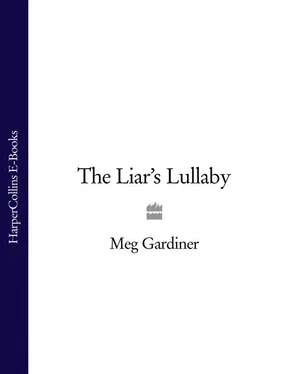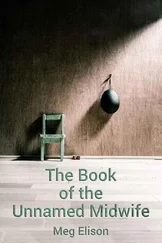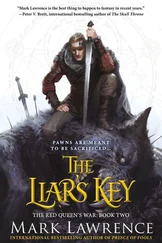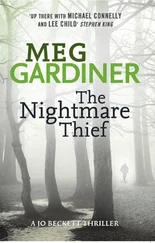Tang led her to one of the corporate hospitality suites. As they walked, she summed up what Shirazi had already told the police.
“He tried to talk Tasia into putting down the weapon—the only thing she was supposed to take onstage was her bad, Botoxed self. She refused, but didn’t threaten him or the crowd or herself. Wasn’t angry. She was frazzled and terrified.”
Tang knocked on the door and entered the hospitality suite. It was filled with cops and stadium officials. A television was tuned to a news channel. Shirazi was pacing, phone to his ear. When Tang introduced Jo, he ended the call and shook her hand.
“I’ve been talking to detectives and lawyers for two hours,” he said. “Please, read my written statement, or else ask me something new.”
He had warm eyes in a rough face, and bounced on his toes as he talked, like a welterweight boxer. In film credits, Jo thought, he’d get stuck as “Thug” or “Crazed Bomber.”
“I’m assessing Tasia’s state of mind. Can you describe her mood tonight?” she said.
“She was wired.”
“Can you be specific? Wired meaning happy? Coked up?”
“Not coked up. At least, she said she was clean. And not happy. I’ve seen her ecstatic, zooming a million miles an hour, and she had a smile, man…but tonight she was agitated.” He circled his hands, seeking the right description. “Once she started talking, I couldn’t get her to stop. It was like her mind was a popcorn machine.”
He shook his head. “I heard she was bipolar. Tonight she seemed manic and depressed. She was energized but dismal. Saying things like, ‘Life’s a bitch and then you die. Like Princess Di.’ And making musical…jokes, kind of, but bummers. ‘Do, re, mi, fa, so long, suckers.’”
“She mentioned death, more than once?”
“She said tonight was all about life and death. She mentioned martyrdom. Car bombs, death squads, holy war.” He tilted his head. “Then she mentioned the Secret Service. And said, ‘He’s out there.’”
“You think she was referring to the president?” Jo said.
“Maybe. But I thought tonight’s main event was supposed to be a concert, so what do I know?”
“Anything else you noticed about her attitude tonight?”
“Yeah. Everything was exaggerated. She came in with the corset undone more than usual, the jeans slung lower, and her makeup was just extreme.” He looked weary. “She acted like she was the center of the universe. All performers do, but tonight she really believed it was all about her. She seemed—on a mission.”
“And this was a change from her mood recently?”
Shirazi rubbed his chest as though it ached. “Yeah. At the start of the national tour, couple months back, she was really up. Bubbly. Then she went flat. Moody, withdrawn—I mean, it was a noticeable swing. But over the past few weeks, everything’s been building up. Her energy and her…discontent.”
“Wired but miserable.”
“You got it.”
His phone rang. He took the call, said, “On my way,” and hung up. “My brother was in the helicopter that hit the bay. He just came out of surgery. I need to get to the hospital.”
“All right,” Tang said. “Anything else you can tell us before you go?”
“I got a terrible feeling she was going play with the gun like a toy. It was a recipe for disaster. And I wish I could tell you what happened. When I couldn’t break the plate-glass windows, I ran for the suite next door, to see if I could get to her on the balcony. But I heard the gunshot.” His voice ebbed. “I ran out of time.”
Tang gave him her card, and said she’d be in touch. He headed out the door.
“Initial assessment?” Tang said.
“Besides the fact that Shirazi feels guilty that she died?” Jo said. “Get a tox screen on Tasia. If she wasn’t on cocaine or amphetamines, she was having some kind of manic episode.”
“You don’t sound convinced about that.”
“Manic episodes are characterized by euphoria, and Tasia sounds far from euphoric. But other things fit,” she said. “With mania, people can’t stop talking. Their speech becomes pressured. And they’re showy. They wear bright-colored clothes and tons of inappropriate makeup. It looks…off.”
Tang nodded. “ ‘Playing in the crayon box’ is the phrase the makeup woman used.”
Jo thought again about the game Tasia had acted out with the Colt .45. “They can also be hypersexual. And they can have grandiose delusions.”
“Like they’re the target of an assassination plot?”
“When people with bipolar disorder become paranoid, they think massive forces are threatening them. Not merely the neighbors and the mother-in-law and their shrink.”
“Such as the president of the United States?”
“There’s the rub,” Jo said.
Behind them, conversation bubbled above the noise from the television. Jo mulled what she’d seen and heard.
“Three possibilities. One, the pistol was defective. It just went off,” she said.
“Unlikely. But we’ll tear it apart and find out.”
“Two, Tasia McFarland put the gun to her head and pulled the trigger.”
“You believe that less than you did ten minutes ago.”
“Three—”
On the TV, a news anchor said, “Now we go to the White House, where President McFarland is about to speak about the death of his ex-wife.”
JO AND TANG CROWDED AROUND THE TELEVISION WITH THE COPS AND stadium officials in the suite. On-screen, the White House press secretary stood at a podium, pudgy and diffident. The pressroom was a forest of jutting hands, all raised to ask about the death of Robert McFarland’s first wife, the lovely, tragic, maybe crazy Fawn Tasia.
A reporter asked, “Did the president know that she was in possession of the Colt forty-five?”
“The president isn’t going to comment on matters that might fall within the scope of the investigation into Ms. McFarland’s death. Obviously he wants to avoid any remarks that could compromise the investigation.”
“But did he deliberately leave the gun with her when they divorced?”
The press secretary adjusted his glasses. His forehead looked shiny. “The president will issue a statement momentarily. If I could—”
“Tasia McFarland was a diagnosed manic-depressive. Did the president know of that diagnosis at the time he left a large caliber semiautomatic pistol in her possession?”
Jo said, “Wow.”
There was a stir in the pressroom. The press secretary said, “Ladies and gentlemen, the president.”
The camera swiveled. Robert Titus McFarland strode toward the podium, grave and purposeful.
He had the ascetic build and weightless gait of a cross-country runner. His hair, black as a priest’s cassock, was shorn unfashionably short, a legacy of his army years. His temples were salted with gray.
He gripped the edges of the podium. He looked drawn. He didn’t have the aw-shucks charm of Bill Clinton, didn’t have Kennedy’s élan or Reagan’s disarming ability to project whimsy. He had a craggy dignity and laconic style that pundits called “western” and attributed to his Montana roots.
He peered into the lights. “The news tonight from San Francisco has come as a shock, and has saddened me, deeply.”
He let that last word fall heavily. He let it roll across the press corps until it pinned them to their seats and smothered all noise in the room.
“My thoughts are with the family of the pilot who lost his life, and with all those who were injured.”
McFarland was an outlier: a working-class liberal, a warrior turned antiwar. He had grown up in a double-wide trailer on a cattle ranch outside Billings, son of the ranch foreman and his Salvadoran wife. He won the state cross-country championship, received a commission to West Point, and served as an army officer in hot zones across the globe before—famously—resigning his commission in protest over a friendly fire incident for which junior officers took the blame while higher-ups escaped censure. He returned to Montana, went to law school, practiced environmental law, and went into politics. His rise was swift. He won the presidency after serving five years in the Senate.
Читать дальше












